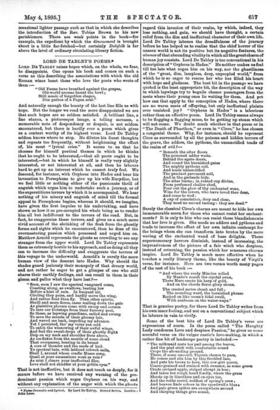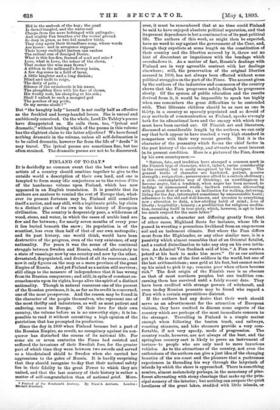LORD DE TABLEY'S POEMS.* • Poems Dramatic and Lyrical. By
Lord De TaVey. Second Series. London : John Lane. LORD DE TABLEY raises hopes which, on the whole, we fear, he disappoints. One opens his book and comes on such a verse as this describing the associations with which the old Roman wines beset those who love the poets who wrote of them :-
"Old Fauns have breathed against the grapes, Old-world aromas haunt the bowl; Still music of forgotten shapes, Dim pathos of a Pagan soul."
And naturally enough the beauty of the last line fills us with hope. But the longer we read the more disappointed we are that such hopes are so seldom satisfied. A brilliant line, a fine stanza, a picturesque image, a telling sarcasm, a memorable note of despondency or despair, is not seldom encountered, but there is hardly ever a poem which gives as a context worthy of its highest verse. Lord De Tabley seldom knows where to stop. He dilutes his finest thoughts and repeats too frequently, without heightening the effect of, his most "lyrical cries." It seems to us that he chooses for himself poetical themes in which he thinks that he ought to be interested,—that all poets ought to be interested,—but in which he himself is really very slightly interested, or not interested at all, and then he labours hard to get up an interest which he cannot truly feel. We descend, for instance, with Orpheus into Hades and hear his invocation to Persephone to give up his wife Eurydice, but we feel little or nothing either of the passionate thrill of anguish which urges him to undertake such a journey, or of the superstitious terrors by which it is accompanied. We hear nothing of his misery and anguish of mind till the formal appeal to Persephone begins, whereas it should, we imagine, have given the first impulse to his undertaking, and have shown us how it so pre-occupied his whole being as to render him all but indifferent to the terrors of the road. But, in fact, he exaggerates these terrors, and gives us a much more vivid account of the shrinking of the flesh from the ghostly forms and sights which he encountered, than he does of the overmastering passion which possessed and urged him on. Matthew Arnold represents the ghosts as crowding to see any stranger from the upper world. Lord De Talley represents them as extremely hostile to his approach, and as doing all they can to increase the difficulty and exaggerate the terrors of this voyage to the underworld. Arnold's is surely the more human view of the descent into Hades. Why should the shades guard jealously their monopoly of that dreary world, and not rather be eager to get a glimpse of one who still shares their earthly feelings, and can recall to them in their gloom and pallor what they have lost P- " Soon, soon I saw the spectral vanguard come, Coasting along, as swallows, beating low Before a hint of rain. In buoyant air, Circling they poise, and hardly move the wing, And rather float than fly. Then other spirits, Shrill and more fierce, came wailing down the gale As plaintive plovers come with swoop and scream To lure our footsteps from their furrowy nest,
• So these, as lapwing guardians, sailed and swung To save the secrets of their gloomy lair, And waved me back, impeding my advance. Yet I persisted, tho' my veins ran cold To catch the winnowing of their awful wings, And feel the sweat-drops of their ghostly flight Drip on my neck and shoulder from above, As ice-flakes from the mantle of some cloud That overpasses, bearing in its breast A core of thunder and the seeds of hail.
Ye spectral bats, with latticed cobweb sails, Shall I, around whose cradle Muses sang, Quail at your emanations weak as rain ?
As mist I cleave your ineffectual files, Love shall not shudder at your goblin eyes."
That is not ineffective, but it does not touch us deeply, for it occurs before we have received any warning of the pre- dominant passion which urges Orpheus on his way, and without any explanation of the anger with which the ghosts
regard this invasion of their realm, by which, indeed, they lose nothing, and gain, we should have thought, a certain
relief from the dim and ineffectual character of their own life. Lord De Table), labours the dreadfulness of the journey before he has helped us to realise that the chief horror of the unseen world is not its positive but its negative features, the absence of that abounding vitality in which all the great charm of human joy consists. Lord De Tabley is too conventional in his description of" Orpheus in Hades." He neither makes us feel
till too late what urges him on his way, nor the ghastliness of the "great, dim, lampless, deep, unpeopled world," from which he is so eager to rescue her who has filled his heart with hope and gladness. The best bit in the passage we have quoted is the least appropriate bit, the description of the way in which lapwings try to beguile chance passengers from the nests where their young ones lie waiting for them. And yet how can that apply to the conception of Hades, where there
are no warm nests of offspring, but only ineffectual plaints over vanished joy ? "Orpheus in Hades" is a laborious
rather than an effective poem. Lord De Tabley seems always to be flogging a flagging muse, to be getting up steam which will not come. We doubt much whether in that poem or in "The Death of Phaethon," or even in "Circe," he has chosen a congenial theme. Why, for instance, should he represent Circe as surrounded by all the poisons and hidden terrors of the grave, the adders, the pythons, the unsanctified toads of the realm of evil ?—
" Beneath the altar floors
The poisoned adder waits.
Behind the agate doors, And round the burnished gates The mighty pythons coil.
And toads unsa.netified The precinct pavement soil, And in the garlands hide.
The altar burns ; in rubied cup divine,
From perfumed chalice shed, Pour out the glow of thy enchanted wine,
Wine for the lovers, who have loved thee dear,
And come to wed: A cup of consolation, deep and clear,
They need no second tasting : they are dead."
Surely the classical Circe's charms are meant to hide her own immeasurable scorn for those who cannot resist her enchant-
ments P It is only to him who can resist those blandishments that her love is given. She needs no adders and pythons and toads to increase the effect of her own infinite contempt for
the beings whom she can transform into brutes by the mere waving of the enchanted wand of base delights. These supernumerary horrors diminish, instead of increasing, the impressiveness of the picture of a fair witch who despises, instead of returning, the passion which her sensuous charms inspire. Lord De Tabley is much more effective when he touches a really literary theme, like the beauty of Irirgirs verse, for instance. Here are two verses worth many pages of the rest of his book :—
"And where the reedy Blincius rolled By Manto's marsh the crystal swan, There Maro smote his harp of gold, And on the chords fierce glory shone.
The crested metre clomb and fell ;
The sounding word, the burnished phrase
Rocked on like ocean's tidal swell, With sunbeam on the water-ways."
That is genuine poetry, for there Lord De Tabley writes from his own inner feeling, and not on a conventional subject which he labours in vain to vivify.
Some of the best bits of Lord De Tabley's verse are expressions of scorn. In the poem called "The Haughty Lady condemns Love and despises Passion," he gives us some scornful verse on the vulgar rustic's love-making, in which a rather fine bit of landscape poetry is included:—
" The milkmaid rests her pail among the leaves,
And the pied stirk with comfortable sound Crops the abounding ground.
There, if some uncouth Thyrsis chance to pass, He comes and sits him by this freckled lass, And puts his brows to hers, this cow-girl queen,
Coarse-grained and stained with summer, as some green
Crude orchard apple, striped abrupt in hue;
And takes her rough hand fondly, where the grass
Shoots up in timothies and ox-eyes too,
And the rathe sorrel, reddest of spring's crew; And heaven finds echoes in the speedwell's blue And pale green spikes are everywhere around And chirping things give sound, Hid in the ambush of the hay; the quail Is darnel-tangled, and the water-rail Cheeps from the mere befringed with galingale : And mighty Pan breathes o'er the vernal ground. So deep in grass, as two hid meadow birds, They sing again their threadbare song, whose words Are kisses : and in arrogance suppose Their horny rushlight lantern can enclose The radiant sun of demigod Desire.
What is this fen-fire, framed of mud and mire?
Love, what is Love, the solace of the clown, That makes the wise man frown ?
A ribbon in the milkmaid's frowsy hairs, A few dog-roses in a field of tares, A little laughter and a long disdain; Blind and unfit to reign, The deity of pain ; Silent's of the swineherds is his name, The ploughboy Eros with his face of shame, His woolly coat, his sheepdog at his side; Shall I unlock to such a mongrel god The porches of my pride, Or my serene abode ? "
But "the haughty lady" herself is not really half as effective as the freckled and horny-handed lovers. She is unreal and ambitiously conceived. On the whole, Lord De Tabley's poems have disappointed us. He calls them, too, "lyrical and dramatic," without hinting which of the poems in this volume has the slightest claim to the latter adjective P We have found nothing dramatic in the volume, unless all self-delineation is to be called dramatic, however far from the life of " deeds " it may travel. The lyrical poems are sometimes fine, but too often strained. The dramatic poems are not to be discovered.







































 Previous page
Previous page